Critical Reflection on Culturally Safe Nursing Practice (NURS101)
VerifiedAdded on 2023/01/17
|5
|1063
|45
Essay
AI Summary
This reflective essay explores a nursing student's experiences and learning in providing culturally safe nursing practice, particularly concerning the Aboriginal and Torres Strait Islander (ATSI) peoples. The student reflects on the importance of understanding ATSI cultural beliefs, including their perspectives on physical, mental, and spiritual wellbeing, as well as their use of alternative medicine. The essay highlights the need for nurses to be open-minded, non-judgmental, and culturally competent in order to provide holistic care and address health inequalities. The student discusses the impact of prejudice on ATSI health and the importance of practical experience in developing culturally safe nursing practices. The essay references relevant literature to support the reflection and emphasizes the need for ongoing development in culturally safe care.
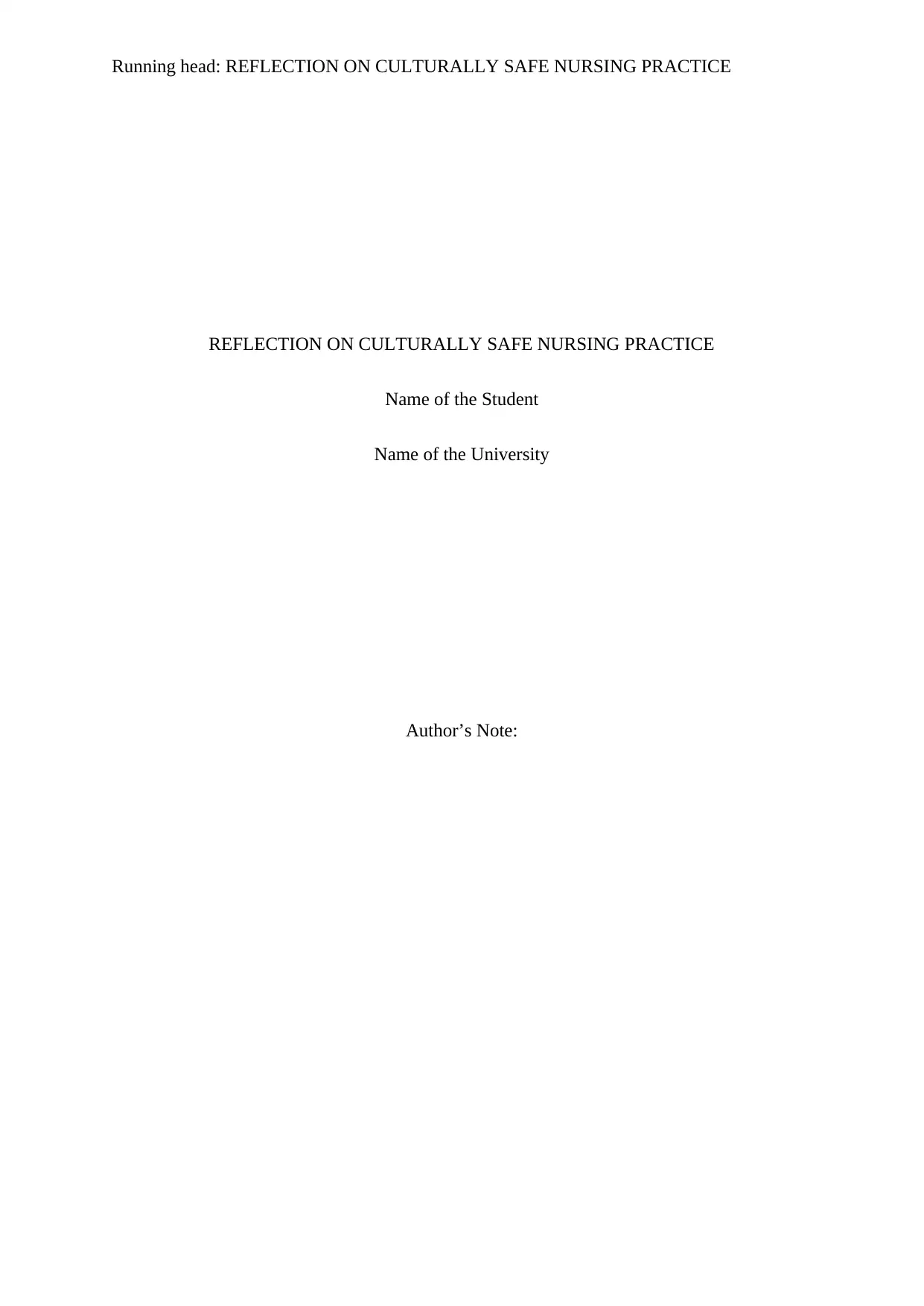
Running head: REFLECTION ON CULTURALLY SAFE NURSING PRACTICE
REFLECTION ON CULTURALLY SAFE NURSING PRACTICE
Name of the Student
Name of the University
Author’s Note:
REFLECTION ON CULTURALLY SAFE NURSING PRACTICE
Name of the Student
Name of the University
Author’s Note:
Paraphrase This Document
Need a fresh take? Get an instant paraphrase of this document with our AI Paraphraser
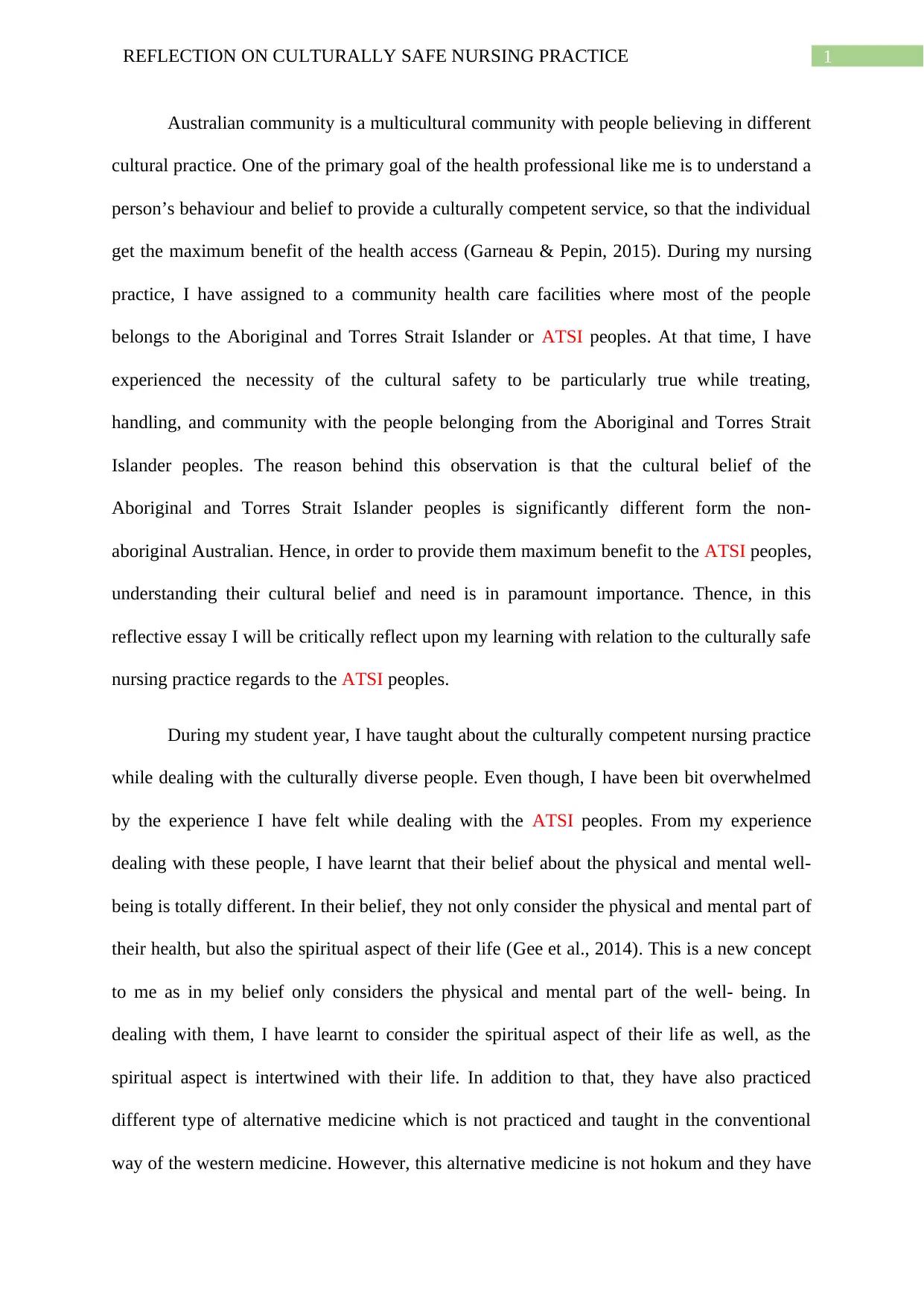
1REFLECTION ON CULTURALLY SAFE NURSING PRACTICE
Australian community is a multicultural community with people believing in different
cultural practice. One of the primary goal of the health professional like me is to understand a
person’s behaviour and belief to provide a culturally competent service, so that the individual
get the maximum benefit of the health access (Garneau & Pepin, 2015). During my nursing
practice, I have assigned to a community health care facilities where most of the people
belongs to the Aboriginal and Torres Strait Islander or ATSI peoples. At that time, I have
experienced the necessity of the cultural safety to be particularly true while treating,
handling, and community with the people belonging from the Aboriginal and Torres Strait
Islander peoples. The reason behind this observation is that the cultural belief of the
Aboriginal and Torres Strait Islander peoples is significantly different form the non-
aboriginal Australian. Hence, in order to provide them maximum benefit to the ATSI peoples,
understanding their cultural belief and need is in paramount importance. Thence, in this
reflective essay I will be critically reflect upon my learning with relation to the culturally safe
nursing practice regards to the ATSI peoples.
During my student year, I have taught about the culturally competent nursing practice
while dealing with the culturally diverse people. Even though, I have been bit overwhelmed
by the experience I have felt while dealing with the ATSI peoples. From my experience
dealing with these people, I have learnt that their belief about the physical and mental well-
being is totally different. In their belief, they not only consider the physical and mental part of
their health, but also the spiritual aspect of their life (Gee et al., 2014). This is a new concept
to me as in my belief only considers the physical and mental part of the well- being. In
dealing with them, I have learnt to consider the spiritual aspect of their life as well, as the
spiritual aspect is intertwined with their life. In addition to that, they have also practiced
different type of alternative medicine which is not practiced and taught in the conventional
way of the western medicine. However, this alternative medicine is not hokum and they have
Australian community is a multicultural community with people believing in different
cultural practice. One of the primary goal of the health professional like me is to understand a
person’s behaviour and belief to provide a culturally competent service, so that the individual
get the maximum benefit of the health access (Garneau & Pepin, 2015). During my nursing
practice, I have assigned to a community health care facilities where most of the people
belongs to the Aboriginal and Torres Strait Islander or ATSI peoples. At that time, I have
experienced the necessity of the cultural safety to be particularly true while treating,
handling, and community with the people belonging from the Aboriginal and Torres Strait
Islander peoples. The reason behind this observation is that the cultural belief of the
Aboriginal and Torres Strait Islander peoples is significantly different form the non-
aboriginal Australian. Hence, in order to provide them maximum benefit to the ATSI peoples,
understanding their cultural belief and need is in paramount importance. Thence, in this
reflective essay I will be critically reflect upon my learning with relation to the culturally safe
nursing practice regards to the ATSI peoples.
During my student year, I have taught about the culturally competent nursing practice
while dealing with the culturally diverse people. Even though, I have been bit overwhelmed
by the experience I have felt while dealing with the ATSI peoples. From my experience
dealing with these people, I have learnt that their belief about the physical and mental well-
being is totally different. In their belief, they not only consider the physical and mental part of
their health, but also the spiritual aspect of their life (Gee et al., 2014). This is a new concept
to me as in my belief only considers the physical and mental part of the well- being. In
dealing with them, I have learnt to consider the spiritual aspect of their life as well, as the
spiritual aspect is intertwined with their life. In addition to that, they have also practiced
different type of alternative medicine which is not practiced and taught in the conventional
way of the western medicine. However, this alternative medicine is not hokum and they have
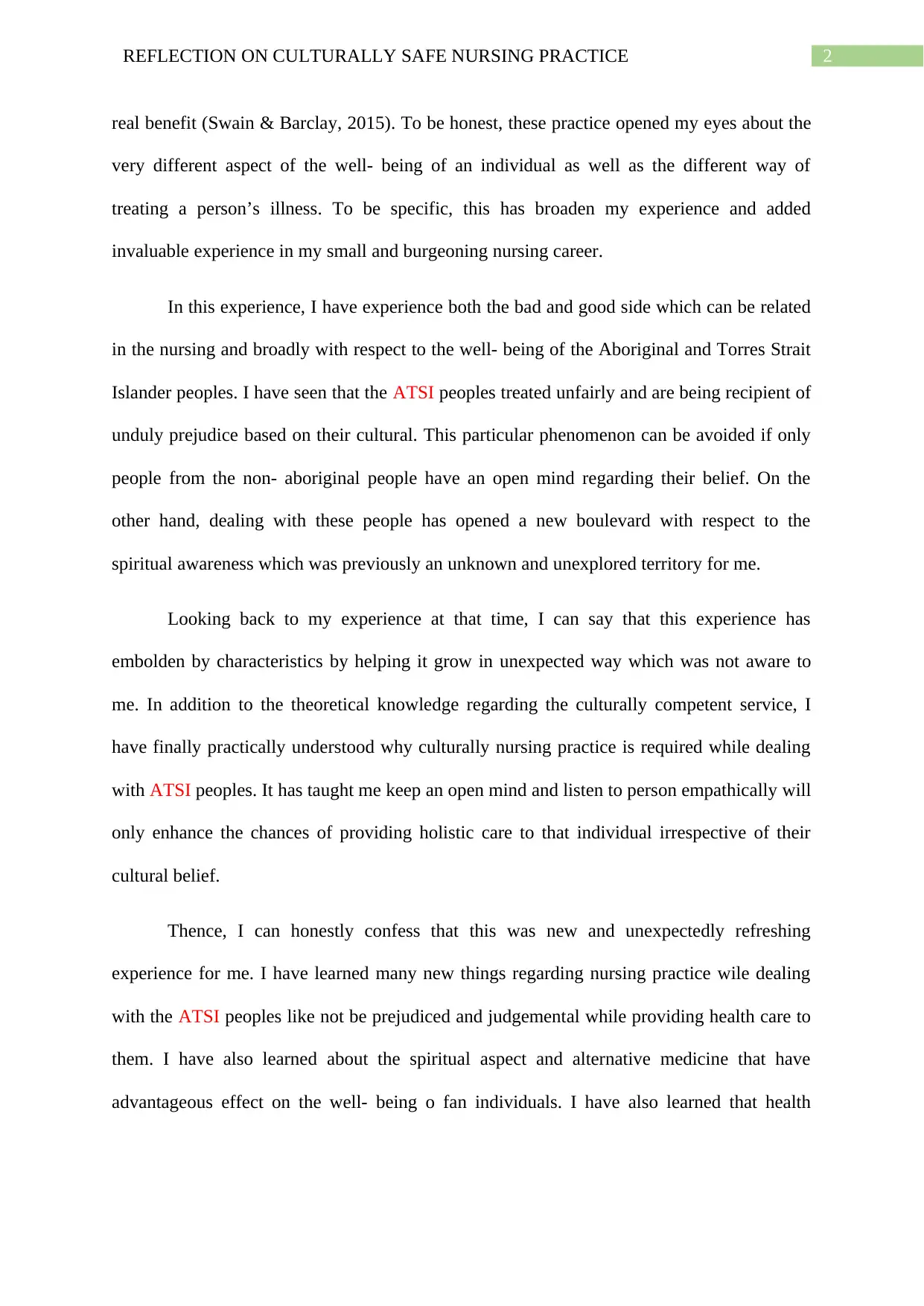
2REFLECTION ON CULTURALLY SAFE NURSING PRACTICE
real benefit (Swain & Barclay, 2015). To be honest, these practice opened my eyes about the
very different aspect of the well- being of an individual as well as the different way of
treating a person’s illness. To be specific, this has broaden my experience and added
invaluable experience in my small and burgeoning nursing career.
In this experience, I have experience both the bad and good side which can be related
in the nursing and broadly with respect to the well- being of the Aboriginal and Torres Strait
Islander peoples. I have seen that the ATSI peoples treated unfairly and are being recipient of
unduly prejudice based on their cultural. This particular phenomenon can be avoided if only
people from the non- aboriginal people have an open mind regarding their belief. On the
other hand, dealing with these people has opened a new boulevard with respect to the
spiritual awareness which was previously an unknown and unexplored territory for me.
Looking back to my experience at that time, I can say that this experience has
embolden by characteristics by helping it grow in unexpected way which was not aware to
me. In addition to the theoretical knowledge regarding the culturally competent service, I
have finally practically understood why culturally nursing practice is required while dealing
with ATSI peoples. It has taught me keep an open mind and listen to person empathically will
only enhance the chances of providing holistic care to that individual irrespective of their
cultural belief.
Thence, I can honestly confess that this was new and unexpectedly refreshing
experience for me. I have learned many new things regarding nursing practice wile dealing
with the ATSI peoples like not be prejudiced and judgemental while providing health care to
them. I have also learned about the spiritual aspect and alternative medicine that have
advantageous effect on the well- being o fan individuals. I have also learned that health
real benefit (Swain & Barclay, 2015). To be honest, these practice opened my eyes about the
very different aspect of the well- being of an individual as well as the different way of
treating a person’s illness. To be specific, this has broaden my experience and added
invaluable experience in my small and burgeoning nursing career.
In this experience, I have experience both the bad and good side which can be related
in the nursing and broadly with respect to the well- being of the Aboriginal and Torres Strait
Islander peoples. I have seen that the ATSI peoples treated unfairly and are being recipient of
unduly prejudice based on their cultural. This particular phenomenon can be avoided if only
people from the non- aboriginal people have an open mind regarding their belief. On the
other hand, dealing with these people has opened a new boulevard with respect to the
spiritual awareness which was previously an unknown and unexplored territory for me.
Looking back to my experience at that time, I can say that this experience has
embolden by characteristics by helping it grow in unexpected way which was not aware to
me. In addition to the theoretical knowledge regarding the culturally competent service, I
have finally practically understood why culturally nursing practice is required while dealing
with ATSI peoples. It has taught me keep an open mind and listen to person empathically will
only enhance the chances of providing holistic care to that individual irrespective of their
cultural belief.
Thence, I can honestly confess that this was new and unexpectedly refreshing
experience for me. I have learned many new things regarding nursing practice wile dealing
with the ATSI peoples like not be prejudiced and judgemental while providing health care to
them. I have also learned about the spiritual aspect and alternative medicine that have
advantageous effect on the well- being o fan individuals. I have also learned that health
⊘ This is a preview!⊘
Do you want full access?
Subscribe today to unlock all pages.

Trusted by 1+ million students worldwide
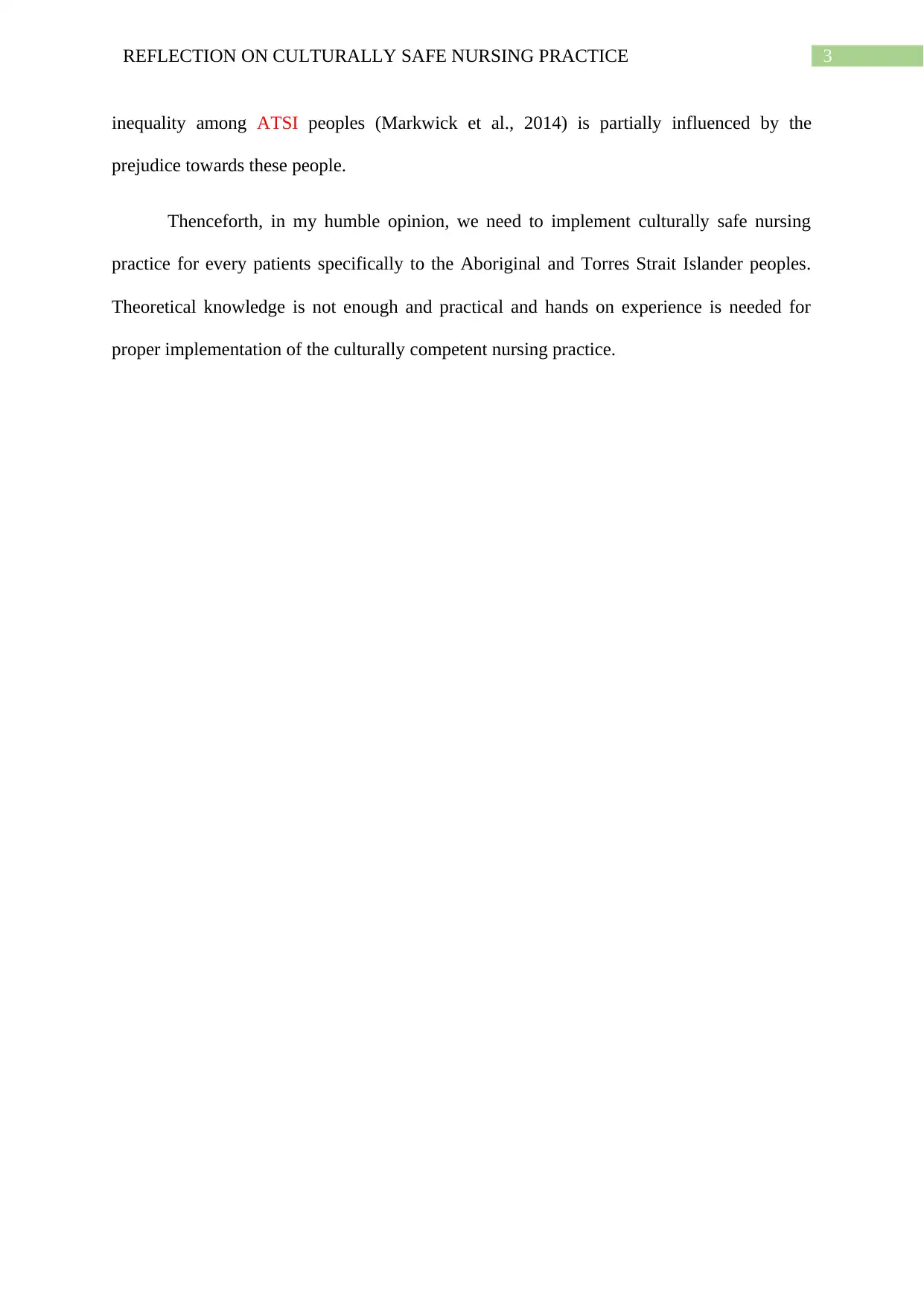
3REFLECTION ON CULTURALLY SAFE NURSING PRACTICE
inequality among ATSI peoples (Markwick et al., 2014) is partially influenced by the
prejudice towards these people.
Thenceforth, in my humble opinion, we need to implement culturally safe nursing
practice for every patients specifically to the Aboriginal and Torres Strait Islander peoples.
Theoretical knowledge is not enough and practical and hands on experience is needed for
proper implementation of the culturally competent nursing practice.
inequality among ATSI peoples (Markwick et al., 2014) is partially influenced by the
prejudice towards these people.
Thenceforth, in my humble opinion, we need to implement culturally safe nursing
practice for every patients specifically to the Aboriginal and Torres Strait Islander peoples.
Theoretical knowledge is not enough and practical and hands on experience is needed for
proper implementation of the culturally competent nursing practice.
Paraphrase This Document
Need a fresh take? Get an instant paraphrase of this document with our AI Paraphraser
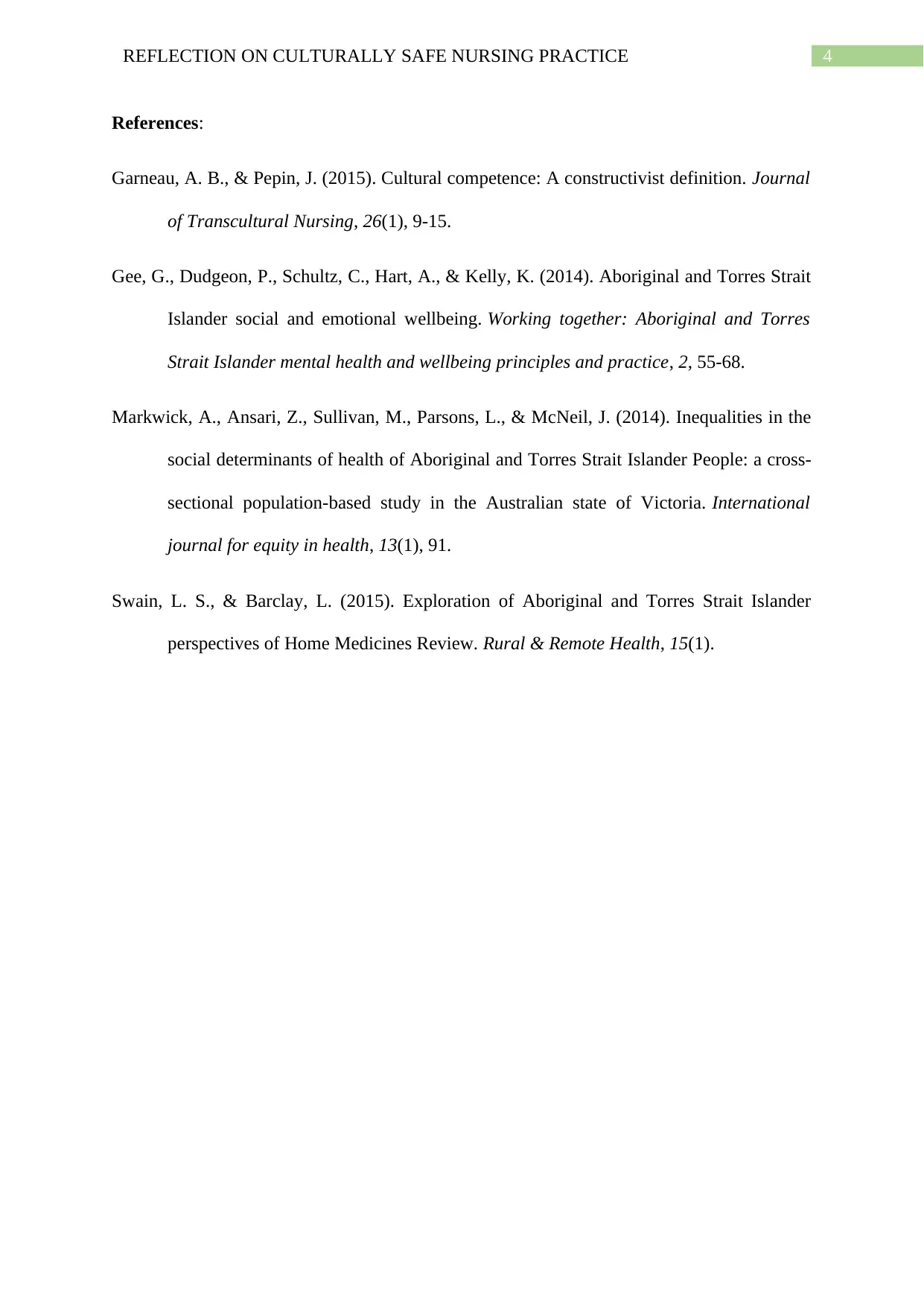
4REFLECTION ON CULTURALLY SAFE NURSING PRACTICE
References:
Garneau, A. B., & Pepin, J. (2015). Cultural competence: A constructivist definition. Journal
of Transcultural Nursing, 26(1), 9-15.
Gee, G., Dudgeon, P., Schultz, C., Hart, A., & Kelly, K. (2014). Aboriginal and Torres Strait
Islander social and emotional wellbeing. Working together: Aboriginal and Torres
Strait Islander mental health and wellbeing principles and practice, 2, 55-68.
Markwick, A., Ansari, Z., Sullivan, M., Parsons, L., & McNeil, J. (2014). Inequalities in the
social determinants of health of Aboriginal and Torres Strait Islander People: a cross-
sectional population-based study in the Australian state of Victoria. International
journal for equity in health, 13(1), 91.
Swain, L. S., & Barclay, L. (2015). Exploration of Aboriginal and Torres Strait Islander
perspectives of Home Medicines Review. Rural & Remote Health, 15(1).
References:
Garneau, A. B., & Pepin, J. (2015). Cultural competence: A constructivist definition. Journal
of Transcultural Nursing, 26(1), 9-15.
Gee, G., Dudgeon, P., Schultz, C., Hart, A., & Kelly, K. (2014). Aboriginal and Torres Strait
Islander social and emotional wellbeing. Working together: Aboriginal and Torres
Strait Islander mental health and wellbeing principles and practice, 2, 55-68.
Markwick, A., Ansari, Z., Sullivan, M., Parsons, L., & McNeil, J. (2014). Inequalities in the
social determinants of health of Aboriginal and Torres Strait Islander People: a cross-
sectional population-based study in the Australian state of Victoria. International
journal for equity in health, 13(1), 91.
Swain, L. S., & Barclay, L. (2015). Exploration of Aboriginal and Torres Strait Islander
perspectives of Home Medicines Review. Rural & Remote Health, 15(1).
1 out of 5
Related Documents
Your All-in-One AI-Powered Toolkit for Academic Success.
+13062052269
info@desklib.com
Available 24*7 on WhatsApp / Email
![[object Object]](/_next/static/media/star-bottom.7253800d.svg)
Unlock your academic potential
Copyright © 2020–2025 A2Z Services. All Rights Reserved. Developed and managed by ZUCOL.




